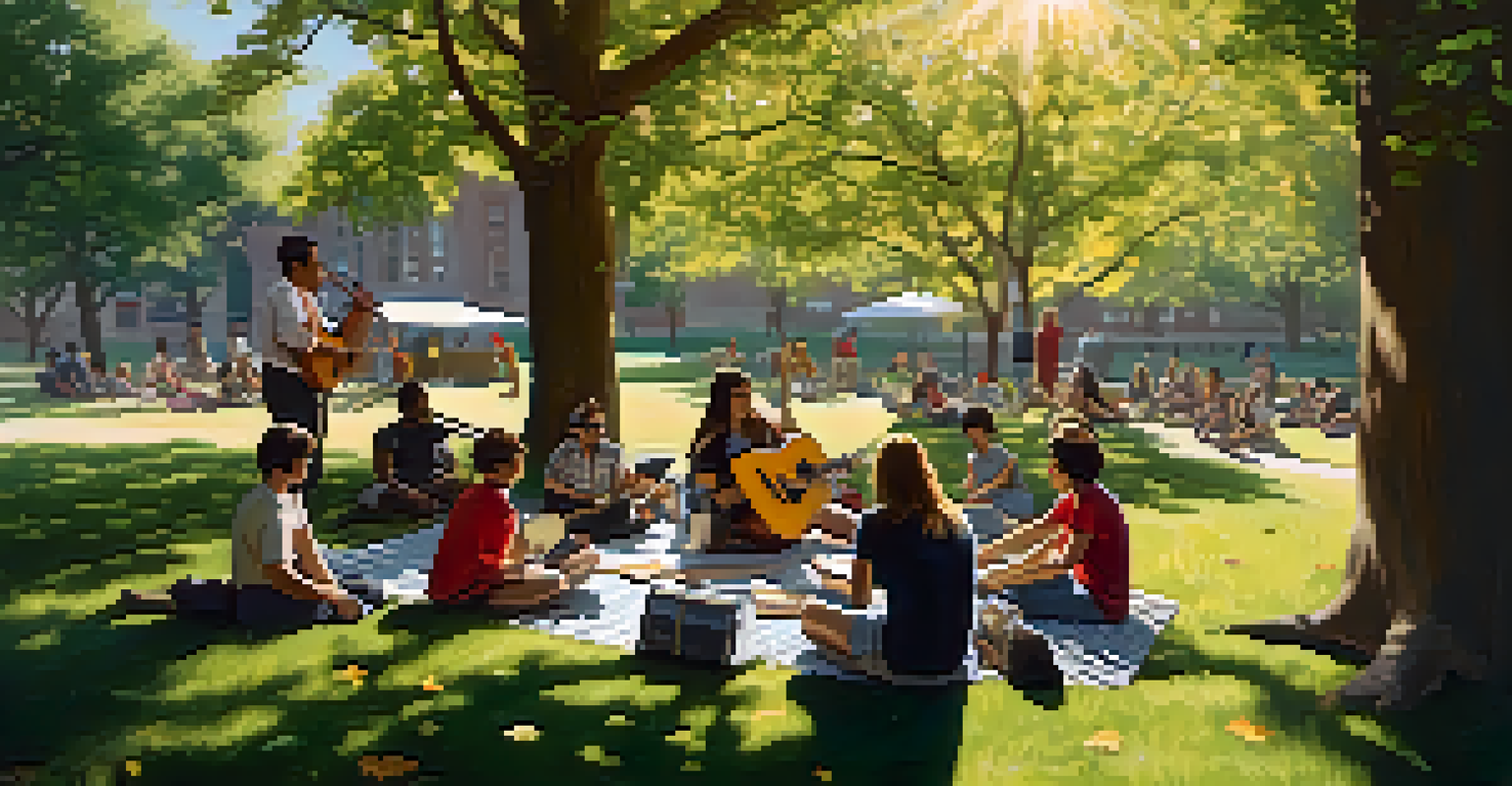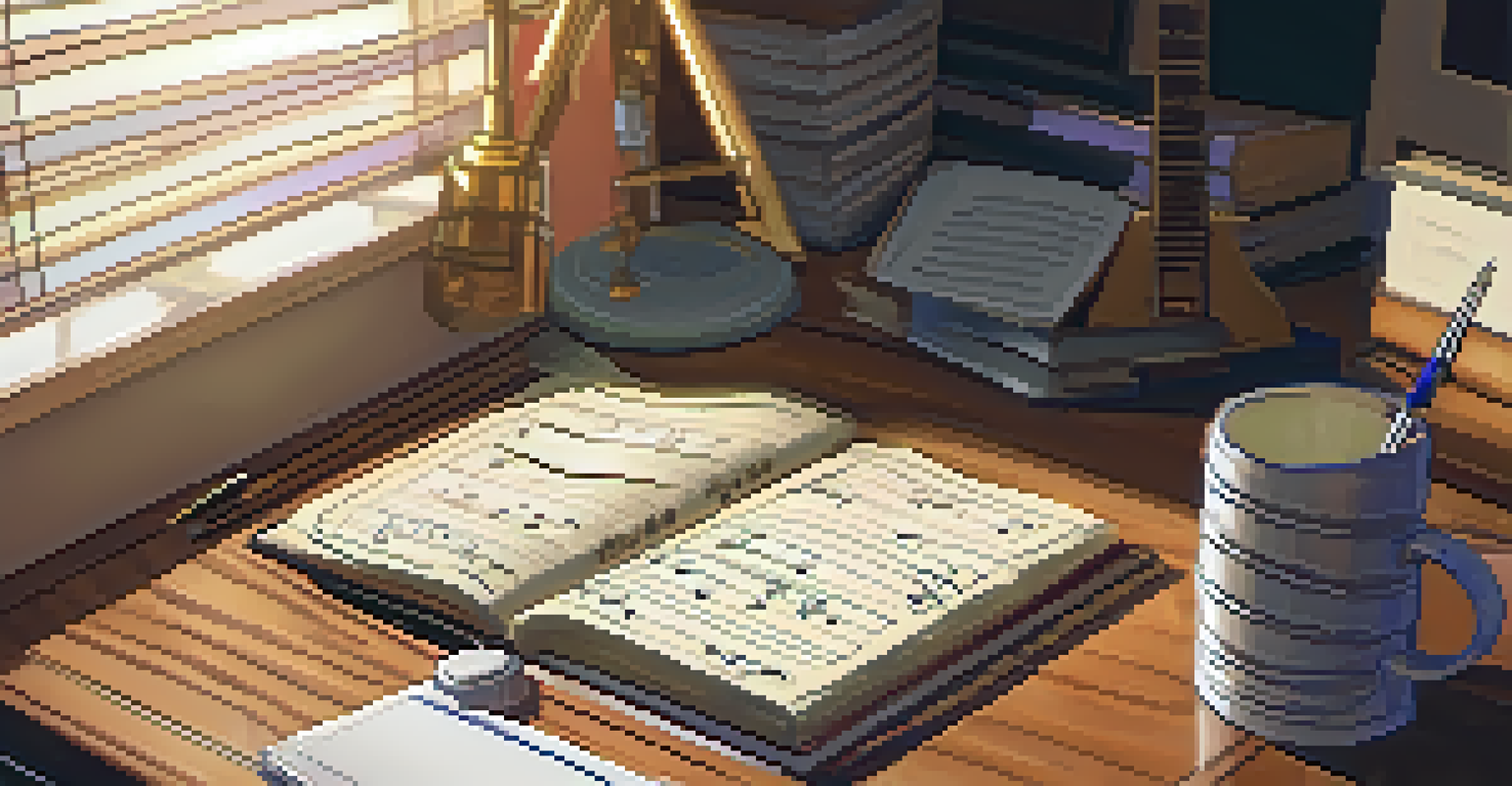Essential Offline Guitar Learning Resources You Need Today

Why Offline Resources Matter for Guitar Learning
In a world dominated by online content, offline resources for guitar learning still hold significant value. They allow you to focus without distractions, providing a tactile experience that enhances retention and understanding. Plus, they can be accessed anytime, anywhere, without relying on an internet connection.
The beautiful thing about learning is that no one can take it away from you.
Think of it this way: while scrolling through online tutorials, you might get sidetracked by notifications or endless content. With books or printed materials, you're in control of your learning pace and environment. This focused approach can lead to deeper insights and a more profound connection with your instrument.
Moreover, many musicians find that physical resources encourage a hands-on approach to practice. It's easier to jot down notes in the margins of a book or highlight passages that resonate with you. These personalized touches can transform your learning experience into a more engaging and memorable journey.
Essential Guitar Method Books for All Levels
Method books are a staple in any guitarist's library, offering structured lessons and exercises. For beginners, books like 'Hal Leonard Guitar Method' provide a solid foundation, covering everything from basic chords to simple songs. These books often come with accompanying CDs or play-along tracks, making practice more enjoyable.

As you progress, consider exploring more advanced texts such as 'The Advancing Guitarist' by Mick Goodrick. This book challenges players to think creatively about their practice and incorporates techniques that can elevate your playing. It’s filled with exercises that push your boundaries and expand your musical vocabulary.
Value of Offline Learning Resources
Offline resources, such as books and DVDs, provide focused, distraction-free environments that enhance understanding and retention.
Don’t overlook the power of genre-specific books, too. Whether you’re into jazz, rock, or classical, there’s a wealth of resources tailored to help you master the nuances of your favorite style. These books not only teach you songs but also delve into the theory behind them, enriching your overall musicianship.
The Value of Guitar Instructional DVDs
Instructional DVDs are a fantastic resource for visual learners who benefit from seeing techniques in action. They often feature professional guitarists demonstrating various skills, making it easier to grasp complex concepts. The combination of audio and visual elements can significantly enhance your learning experience.
Music is the soundtrack of your life.
For example, DVDs by renowned players like Joe Satriani or Paul Gilbert offer insights into their unique playing styles. You can follow along with their exercises, picking up tips and tricks that might not be covered in books. This immersive experience can inspire you to experiment with your own playing.
Moreover, many DVDs include play-along tracks and backing music, which can make practice sessions feel more dynamic. Instead of just going through exercises, you can jam along, making the process enjoyable and interactive. This type of engagement can lead to quicker skill development and a more satisfying practice routine.
Using Sheet Music and Songbooks Effectively
Sheet music and songbooks are invaluable for guitarists looking to expand their repertoire. They provide not only the notes but also insights into the song's structure and dynamics. By learning to read music, you open up a world of possibilities, from classical pieces to contemporary hits.
When selecting songbooks, try to find ones that align with your musical interests. Whether you're into classic rock or folk tunes, there’s a songbook out there that caters to your taste. This not only keeps you motivated but also helps you connect with the music on a deeper level.
Importance of Personal Guidance
Finding a skilled guitar teacher offers tailored instruction and accountability, significantly improving your learning process.
Additionally, working through sheet music can improve your sight-reading skills, which is a crucial ability for any musician. It challenges you to play accurately and confidently, reinforcing your understanding of musical notation. Over time, this practice will enhance your overall musicianship and allow you to tackle more complex pieces.
Finding the Right Guitar Teacher for Personal Guidance
One of the most effective offline resources is finding a guitar teacher who can provide personalized guidance. A good instructor tailors lessons to your individual needs, helping you progress at your own pace. This one-on-one interaction can address specific challenges you may face, offering solutions that self-study may not provide.
Consider seeking out teachers who specialize in the style of music you're interested in. Whether it’s blues, jazz, or metal, a teacher with expertise in your preferred genre can offer invaluable insights and techniques. Their experience can help you avoid common pitfalls and accelerate your learning process.
Moreover, having regular lessons creates accountability, motivating you to practice consistently. This structured approach can lead to significant improvements in your playing, as you receive immediate feedback and encouragement. Building a rapport with your teacher can also foster a supportive learning environment, making your guitar journey more enjoyable.
Exploring Local Music Workshops and Jam Sessions
Local music workshops and jam sessions are fantastic opportunities to enhance your guitar skills while connecting with fellow musicians. These events create a community atmosphere where you can share your passion for music, learn from others, and gain new perspectives. Participating in group settings can push you out of your comfort zone and encourage collaboration.
Many music stores or community centers host workshops that cater to various skill levels. You might find classes focusing on specific techniques, songwriting, or even improvisation. These hands-on experiences can deepen your understanding of music and help you develop new skills in a supportive environment.
Benefits of Community Engagement
Participating in local music workshops and jam sessions fosters collaboration, creativity, and personal growth among musicians.
Jam sessions, on the other hand, are informal gatherings where musicians come together to play. They offer a unique opportunity to practice real-life playing with others, improving your timing and adaptability. Plus, they often spark creativity and inspire you to explore new musical ideas that you might not have considered.
Utilizing Practice Journals for Structured Growth
A practice journal is an often-overlooked resource that can significantly enhance your learning experience. By documenting your practice sessions, you can track your progress, set goals, and reflect on what works best for you. This structured approach provides a clear roadmap for improvement and keeps you accountable.
When starting a practice journal, consider noting down specific exercises, songs, and techniques you want to focus on each week. Additionally, jot down any challenges you encounter and how you overcame them. This reflective practice can deepen your understanding of your playing and help you identify patterns in your learning.

Over time, your practice journal becomes a valuable tool that showcases your growth as a guitarist. Looking back at your earlier entries can provide motivation and a sense of accomplishment. It’s like having a personal timeline of your musical journey, reminding you of how far you’ve come.
The Power of Offline Networking in the Music Community
Networking within the local music community can open doors to countless opportunities for growth and collaboration. Whether it’s attending local gigs, participating in music festivals, or joining guitar clubs, these connections can lead to valuable friendships and learning experiences. Engaging with other musicians can inspire you and provide fresh perspectives on your playing.
For instance, meeting fellow guitarists at a local show might lead to forming a band or collaborating on a project. These interactions can challenge you to step outside your usual practice routine, encouraging you to experiment with new styles and techniques. The camaraderie that develops within a music community can be incredibly motivating.
Moreover, networking can provide you with access to exclusive workshops, masterclasses, or even mentorship opportunities. Learning from seasoned musicians through personal connections can accelerate your growth and introduce you to resources you might not have discovered otherwise. In the world of music, relationships are often just as valuable as the skills you acquire.